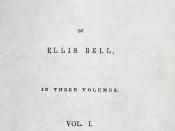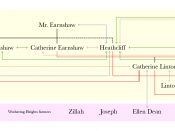There are a few very notable difference in imaginative quality separates the novels of Charlotte (1816-55) and Emily (1818-55) Bronte from those of the other great English novelists of the nineteenth century, even from themselves. The difference seems to be one of emotional intensity, the product of a unique concentration upon fundamental human passion in a state approaching essential purity. Whether this concentration is compatible with the nature of the novel as generally conceived - and there has been a tendency to regard the Bronte's as something of a 'sport', a remarkable oddity in literary history - is no doubt open to discussion. Many of the great novelists of the period -- Dickens, Thackeray and George Eliot -- showed moral and social preoccupations more explicit than those revealed in Wuthering Heights. We may agree that the range of these writers is wider, their points of contact with the human scene more variously projected; but when this has been allowed, there remains to be taken into account an astonishing mixture of romantic commonplace and personal inspiration, primitive feeling and spiritual exaltation, which corresponds to potentialities otherwise largely concealed during this period.
This statement, true of Wuthering Heights, is only partly applicable to the novels of Charlotte Brontë, which reflect the workings of an acute and intensely committed mind. In her position as elder sister and, to a large extent, the substitute for a dead mother, Charlotte's contacts with the outside world were more continuous and varied than those of her sisters. Her excursions into that world did not end as readily as those of Emily in deception and retreat; and this fact is reflected in work that corresponds more closely to the habitual features of the novel form. The earlier chapters of the immensely popular Jane Eyre (1847) rest largely upon...


